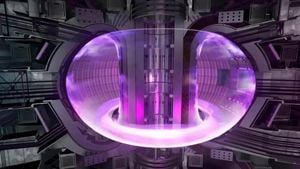Opposition is mounting against Rio Tinto's lithium mining project in Serbia, highlighting significant environmental concerns and political tension. Over the past weeks, thousands have rallied against the proposal, which they fear could inflict irreversible damage on local ecosystems and water supplies.
On Saturday, a massive demonstration took place in Belgrade, drawing tens of thousands of protesters chanting slogans like "There Will Be No Mining" and "Treason, Treason." This display of discontent has been fueled by allegations from Serbian officials claiming the protests are part of a conspiracy to undermine the government of President Aleksandar Vucic.
Vucic has suggested, without providing concrete evidence,that Western powers may have orchestrated these protests as part of efforts to destabilize his administration. His claims mirror the rhetoric often used to frame dissent as externally motivated, diverting attention from the protesters' genuine environmental concerns.
The lithium mining project, which had been scrapped previously due to substantial opposition, was revived after the Serbian government signed agreements with the European Union. This move has intensified local discontent as people worry about the potential pollution of the fertile Jadar valley and its precious underground water resources.
Critics of the project, including local residents and ecological activists, argue it prioritizes international business interests over the well-being of Serbian citizens. They have called for formal legislation banning lithium mining throughout the country, emphasizing the necessity of protecting agriculture and natural habitats.
During the protests, organizers insisted their motives are ecological, stating explicitly, "Our rally today is ecological and has no political ambitions." Nonetheless, Serbian officials have characterized the protests as not merely environmental but political attempts to destabilize the government.
Among the speakers at the protests was notable Serbian actress Svetlana Bojkovic, who affirmed the rally's peaceful intentions and underscored the necessity of voicing public opposition against harmful policies. Local groups are increasingly mobilizing to push back against what they see as bureaucratic oppression and overreach.
Environmental activists have raised alarm bells about the potential contamination of the Jadar valley's ecosystems, stressing the risk to local agriculture which thrives on clean water and healthy soil. Officials and Rio Tinto representatives have countered these fears, promising adherence to high environmental standards in mining operations.
Despite such reassurances, public trust remains low, with many locals pledging to resist the mining project vigorously. The situation places significant pressure on Serbia's government, which is simultaneously trying to cement its ties with the EU and maintain relations with traditional allies like Russia and China.
Residents of the Jadar valley have indicated their readiness to do whatever it takes to prevent the mine's establishment. They argue no promise of economic development can outweigh the risks they believe the project poses to their land and health.
The Serbian government has taken steps to address public concerns, establishing medical teams to monitor potential health hazards related to the proposed mining activity, alongside setting up hotlines for local citizens to report their worries. Still, these moves appear largely reactive and insufficient against the growing tide of protests.
Mining Minister Dubravka Djedovic Handanovic has maintained the narrative of economic opportunity, asserting, "Serbia would not only export raw materials but would develop a ‘value chain’" connected to the battery and electric vehicle market. This vision has failed to alleviate the concerns of skeptics who view it as prioritizing corporate aspirations over environmental health.
Public sentiment against lithium mining has swelled, evidenced by the scale of turnout during multiple protests across Serbia, particularly emphasizing the community's commitment to environmental preservation. These protests reflect broader frustrations with what many see as government control and silencing of dissenting voices, especially from environmental activists, who have faced increased scrutiny and even police action for their efforts.
Authorities have even reportedly questioned and searched activists’ homes, intensifying the sentiment of repression among these groups. This treatment has fueled claims of governmental overreach and has left activists increasingly emboldened to speak out, creating perhaps the most significant environmental challenge to Vucic's rigid governance yet.
Community organizers have also linked the lithium mining controversy to wider issues of political accountability, pushing for transparency and civic engagement. They assert the call for mining regulations resonates with broader demands for environmental justice and respect for democratic processes.
Indeed, many protesters express concern not only for themselves but for future generations, insisting on the importance of preserving their land. "I don’t need green cars. I need green apples and green grass," one protester, Angela Rojovic, stated, illustrating the disconnect between corporate promises and local reality.
This struggle against the lithium mining venture encapsulates the intersecting issues of environmental protection, local governance, and the global race for green technology materials. It questions what sustainable development truly means and who is affected by decisions made far away from the community's input.
With the stakes getting higher, it seems the conflict between the Serbian government and its citizens over the lithium mine will not be resolved easily. The outcome remains pivotal not only for local communities but also for the underlying political dynamics within Serbia as it navigates its path toward EU integration.
Rio Tinto's proposed lithium mine symbolizes more than just economic opportunity; it has become the focal point of growing societal tensions over environmental policy, democratic governance, and the prioritization of local versus foreign interests.



